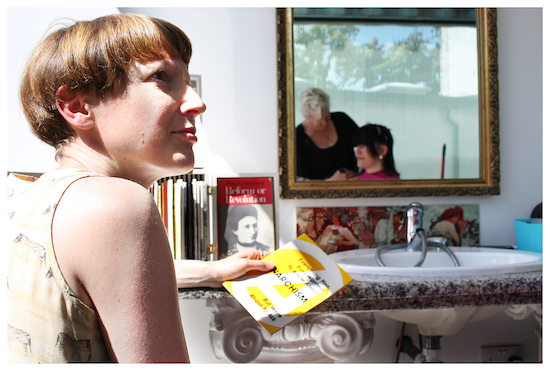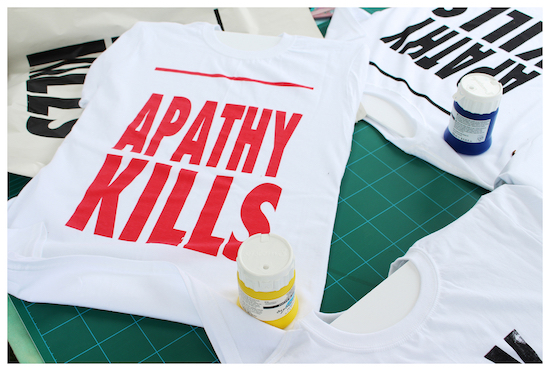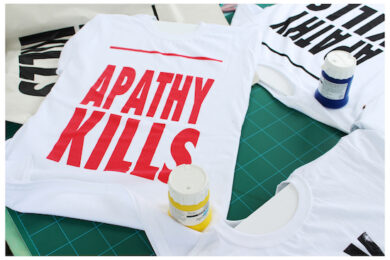Taking place over two days, For and Against: Art, Politics and the Pamphlet was curated by Radar and the RadicalAesthetics-RadicalArt (RaRa) project at Loughborough University. Over a multitude of sites, the project presented a series of talks and provocations on Friday the 27th of May at Loughborough’s Fearon Hall that can be accessed here. The day presented subjects including experiences of publishing zines during the time of Section 28, childcare and economics, as well as undertaking manual work when considering the ongoing crisis in the time of Brexit. Contributions came from Ruth Beale, Tim Brennan, Dean Brannagan, Shirley Cameron, Ben Campkin, Chiara Dellerba, Andrea Gibson, Joanne Lee, radical rethink, Rebecca Ross, Miffy Ryan, Evelyn Silver, Jane Tormey, Mo White, Gillian Whiteley, and Andrew Wilson.
Artist-taxi-driver Mark McGowan presented a keynote speech in which he reflected on the abuses of power manifested by the right wing media and the independence he found in the campaigning of Jeremy Corbyn. He addressed the rise of the new pamphleteers who make their comment through the publication of political memes and gifs on social media. A direct collaboration that reaches the many. These platforms also manifest into life: on his way into Loughborough, McGowan described how he alighted on a community group singing in a library, how this moment stilled him and left him delighted through their conversation and recognition of his work. A space like many others that are so full of life and potential, the ones that are suffering the most from the ongoing programme of austerity.
On Saturday the focus of Pamphlet Day’s events grew expansive, shifting territory from Fearon Hall to take place within the wider context of the town. Placed within the social sites of the library, the park, and the museum, Radar had actively programmed the event outwards to connect to the potential of the casual passer-by. Yet there are other social spaces – in recognition of this, the pamphlet was also placed within the discursive setting of the hairdressers.
Miss B’s Pop-Up Political Hair Salon is an ongoing project by Ruth Beale which activates a history of radical politics through her personal collection of literature. These documents are brought into the conversation that is engaged through the cutting of hair. A dialogue tentatively commenced about the history of anarchism between Ruth, the stylist Diane Russo and myself. As one of the salon’s junior assistants briefly joined with us to discuss her interest in reading sci-fi, the subject of discussion became emboldened. We speculated whether anarchism was formed with a desire to destabilise and flatten hierarchies or whether it was a level of independence that could be performed autonomously by any individual as an extension of their daily working life. As the sun streamed into the salon, pamphlets by Rosa Luxemburg, Antonio Gramsci, and Crass sat alongside hair products, a focused companionship was formed and the potential for a conversation to shift and open up to the unexpected was activated. It is in these moments that art belongs.
The pamphlet lives in the world, as zine, flyer, and manifesto. Here For and Against’s programming felt responsive, and informed by the oppositional nature of this 2017 general election. In Loughborough Market, canvassing was in full swing, and passersby were regaled by representatives from the three main political parties. UKIP evidently weren’t keen to waste their weekend promoting their particular brand of xenophobic isolationism when it’s now been so readily appropriated by the Tories. Emboldened with a sense of curiosity about the pamphlets that each party was distributing, it felt appropriate to discuss with each their motivations in this snap election. I left with a pile of garishly designed literature that made me wonder if the political pamphlet is where graphic designers express humour to the world.
The Lib Dem candidate David Walker’s party pamphlet claimed him to be “open, tolerant and united.” He seemed as such. Labour Candidate Jewel Miah was a “Strong local voice on big national issues” and was readily enthused by the content of For and Against to the point of coming to engage with the projects later in the day. I tapped into my own sense of deep intolerance when talking to one of Conservative MP Nicky Morgan’s assistants. I was swiftly given a pamphlet which proclaimed Loughborough’s election to be a choice between voting for Theresa May or Jeremy Corbyn. There was a genuine end of the world zeal about the Conservative literature that obliterated almost any mention of Morgan’s presence (though election results confirm that she has retained her majority). The only other literature being distributed came from the Redeemed Christian Church of God, who promised “immunisation against Satan’s viral snares.” A concrete poem for the day.
The joyful informality of the market continued at Queen’s Park. Here stalls curated by For and Against presented opportunities for engagement with an assortment of works and projects. Ciara Phillips and fellow participants were busily screen-printing a series of borrowed and adapted slogans onto t-shirts. These clothes were disseminated into the wider project as they were taken away and worn by visitors. The FREEE art collective had set up a neon green kiosk to engage visitors by letting them browse through a series of art pamphlet manifestos. This activity initiated conversations about art’s connectivity to politics, its ability to thrive outside of the commercial market and ask questions. Badges containing slogans including “Riots are Miracles”, “Economists are wrong”, and “borders are for crossing”, were given out to become mobile statements for the body. The pamphlet market was joined among others by UCL’s Urban Laboratory Project, The Leicester Riot Grrrls, Joanne Lee’s Pam Flett Press, and Dust – all sharing space with local writers and The Communist Party of Great Britain. Art collective, Kühle Wampe shared their new zine The Politics of the Artist-led Space.
Commissioned by Radar for the event was The Fertile Ground, a collaboration between artist Rory Pilgrim and Reba Maybury, writer and founder of the publishing house Wet Satin Press. A series of conversations had been initiated with students at Loughborough University that explored the potential opened up by the collapse of the binary in For and Against. Conversations had been engaged with business and economics students about power, anger, apathy, and instinctual emotional care. These exchanges, undertaken on the campus of Loughborough University, explored the dynamics present in personal revelation and sought to investigate a space that could be created in recasting the monolithic scale of party politics through the refusal of polarisation.
From this research, The Fertile Ground was realised – a pamphlet which became an active agent in a performance that took place in Queen’s Park. Sitting in a circle, we were asked to imagine this ground, to breathe it and to embody it. Our eyes closed throughout, we were then asked to turn to the person that we wished to talk to. We were asked the first question from the publication: “What do you want to untangle?”. From this point, other questions emerged. Some of the group sloped away and the circle become smaller, more confessional. We addressed questions of authority, speaking of moments when we had felt empowered. Time drifted, the pamphlet market continued around us, and we addressed the potential that can be found in uncertainty.

Across the road from the park, Little Riot Press had spent the day in occupation in a corner of Loughborough Library, one of the few remaining civic spaces where you don’t need to buy an endless stream of beverages to levy your time spent in the building. A wealth of laminated signs in the window were gaining new layers through the insertion of political propaganda. Tables were placed for the public to come and work alongside the press in the building of a new work. Here, the pamphlet was open to the visitor. Here, the building of a publication could be undertaken with an independent spirit.
On the table were piles of images, cuttings from the Morning Star, and a photocopied stack of Guardian articles that documented Brexit, Farage’s visit to Julian Assange in the Ecuadorian Embassy, and Cambridge Analytica. A dense thicket of political networks was available to cut and conflate into oppositional forms through zine-making. On a nearby pillar, an informally-sited image of Donald Trump biliously peeked over at those engaged.
In Charnwood Museum, there was the space to browse and engage with these histories of advocacy and protest. In vitrines were placed documents drawn from the People’s Museum, The MayDay Rooms Collection, artists’ archives, and personal collections that chart social histories, radical ideas, and peripheral cultures. These documents place the Levellers, Diggers, Socialists, Blackshirts, Miners, Feminists, and Anti-Fascists in context together. Some of the works are available to read; others are listed comprehensively for the curious reader.
For and Against brings the dissemination of ideas through experimental platforms and connects it with the value of civic space. These are found in the halls, libraries, and museums that support and foster social history and the exchange of ideas. Places that give space to the articulation of the ideas and cultural expression of a wider public. Haircuts, the loan and return of books, the exchange of goods, are daily events, ones informed and shaped through the political – both knowingly and unknowingly. In this context, the General Election revealed itself as one of many fought over time. Here in the midst of the polemics, it was those works which questioned dogmatic certainty that felt the most valuable and instructive in the face of our current fragmentation.
For and Against: Art, Politics and the Pamphlet took place in Loughborough on the 26th and 27th of May. The Art of the Pamphlet, is open until Saturday 25 June, 2017, at Charnwood Museum, Loughborough



